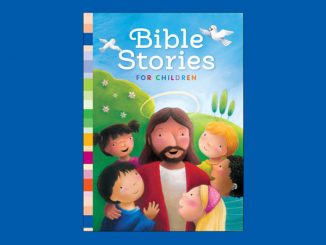
Last evening’s session was very enjoyable on a number of levels. First and foremost, I had an opportunity to once again teach an entire class and I think the kids enjoyed getting back to a sense of normalcy after all of the special events they were a part of over the last six weeks.
We spent the evening focusing one more time on the Bible. The activity with this Bible worksheet (Session 23 Bible Worksheet and Answer Key) went very well but I did need to do a LOT of one-on-one help and offered lots of hints to speed them along. Even so, it was a good exercise to help them locate important passages in the Bible and they were genuinely pleased each time they actually located the passages and stories.
The most interesting part of the session was when I talked about the use of figurative language in the Bible. We talked about some of the stories in the Old Testament belonging to a genre we can call “pre-history” (primarily some of the stories of Genesis – creation, Adam and Eve, Noah’s Ark) and that these stories are not intended to be understood literally the way we would read a history or science book but that they convey the truth about God’s relationship with us and his creation. The kids grasped that really well and I told them that many adults don’t discover this until they are in their 20s or 30s or even later and respond by asking, often angrily, “Why wasn’t I told this in the sixth grade?” I followed that by saying, “So I’m telling you NOW so that you grow up knowing how to read the Bible!” to which I got a few smiles!
Next, however, one of the girls said, “when I was little, I thought that the stories of Jesus were just make believe…that he didn’t really live on earth.” She was asking a question without asking a question (i.e. “so now that I’m older, what should I believe?”). I said, “We know that Jesus was a historical figure and that, in fact, a Roman historian named Josephus records information about Jesus of Nazareth who was executed by Pontius Pilate and whose followers claimed he had risen from the dead.” One of the boys said, “Josephus! We’re learning about him in world history!” The girl who raised the issue then said, “Yeah, we’re learning about Jesus in world history class!” (which she thought was pretty cool given that they attend public school!)
It’s nice when faith formation makes a connection to learning taking place in other areas of the curriculum!
The kids then took their Bibles home with them after we did a short Bible blessing. I hope and pray that these Bibles retain a special place in their lives as the years go on.




“…why wasn’t I told this in the 6th grade?” I followed that by saying, “So I’m telling you NOW so that you grow up knowing how to read the Bible!”
A+!
I’m tempted to give the kids paper NABs next year just like mine- your class did ok with the regular ‘grown-up’ version?
Yeah, Christian, for the most part, they did well. It’s a bit of a challenge for some but I think overall they worked well. Which version have you been using?
I have the plain old red paperback from before the New Translation. I’ll get a new one when this one wears out, or if/when I get new ones for an entire class. On one hand I know they’ll fiddle with it just like a textbook when I want them to pay attention to something else, but the practical value can’t be discounted.
I really enjoyed this post, Joe. I’m one of those adults you mention, who didn’t discover the truth about the various genres until much later in life. I actually became very sad, almost mournful, like I lost someone I loved dearly! And I still have trouble with it. I haven’t broached the subject with my students, mostly because our CCD program doesn’t provide for the study of the OT. It’s very Gospel-driven and we barely have enough time each week to cover Sunday’s Gospel. I’ve always wondered, though, if my students would feel crushed like I did once they found out the truth. Your blog post was a wealth of information for me. Thanks!
Christian, please do share the Bible version you use. Our classrooms are equipped with the “adult” version that Joe uses, and honestly, it’s a complete turn-off for the kids.
Oops I should’ve mentioned I use the adult version. The kids do fine with the content with me reading bits from it…they don’t have any book in class.
I did that lesson with my (homeschool) girls today. One is 10, the other 13. It DID require a lot of one-on-one assistance, but I tried not to help too much. 🙂 I’m hoping they’ll grow in confidence using a concordance, as well as looking at editorial section-headings for help. We have been memorizing from ESV (my current favorite), and we used NIV and NRSV for this exercise, but we have lots of different versions in the shelves available for comparisons.
Thanks for sharing Deborah!
Question: Is the idea of regarding “pre-history” (earliest chapters of Genesis) as non-historical an official Catholic position, or rather one of several “acceptable” positions for Catholic laypeople? I have long considered it more the latter, but if it’s the former I should keep that in mind if I might speak on this topic. Thanks, Joe.
HI Deborah. There’s really no definitive list of which stories the Church considers pre-history and which it considers history however the Church does acknowledge that there are parts of Scripture that are not intended to be read as history. A good place to look for an understandin of this is the document The Interpretation of the Bible in the Church from the Pontifical Biblical Commission.
Wow. That document is BIG. But I have made a beginning with the Preface. Is it available in print? If so, from where?
Yes, Deborah, it is a long document…feel free to skim and get to the parts that deal with literal interpretation and fundamentalism. You can get the document in print form from Amazon: http://www.amazon.com/Interpretation-Church-Pontifical-Bibical-Commssion/dp/0819836702/ref=sr_1_1?s=books&ie=UTF8&qid=1366039206&sr=1-1&keywords=interpretation+of+the+bible+in+the+church
Thanks, Joe. You’ve given me a lot of your time, and I appreciate it.
My pleasure, Deborah.